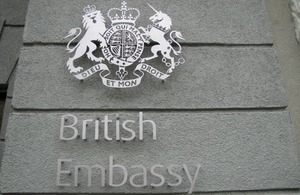Missing but not forgotten
Today marks the ninth “International Day of the Disappeared”. This is a day for people across the world to pause and think of those who are missing.
To lose any loved one is painful. But to lose a loved one and never know their fate or resting place is heart-breaking. This has been the agonising reality for many families across the Western Balkans for more than two decades
As many as 40,000 people disappeared during the conflicts of the 1990s on the territory of the former Yugoslavia. Some 11,000 are still missing. This remains one of the most painful legacies of those conflicts.
As we remember the Disappeared, we pay tribute to all those who have worked so tirelessly to find and identify the victims of the conflict and to bring some comfort to their grieving families.
Amidst the prolonged pain and suffering there is also a remarkable story. More than 70 percent of those reported missing at the end of the fighting have been accounted for. No other post-conflict region has achieved such a high rate of identification.
One reason for this is the use of new technology that has revolutionised the process of identifying human remains. This uses DNA samples from extended family members as well as immediate family, and will enable further progress in closing this painful chapter of the legacy of conflict.
The United Kingdom has been privileged to support and work with government bodies and local and international organisations. They endeavour to give families hope that their loved ones will be found and identified, and give them closure.
Families of the missing have a powerful story to tell. Their voices and actions have continued to help support others who are dealing with this issue. We remain humbled by their courage and determination. As His Royal Highness The Prince of Wales said when meeting them in London, “their dignity and humanity is a lesson to us all, and a reminder that reconciliation is not simply a theoretical abstract concept”.
At the Western Balkans Summit in London in July 2018, in a Joint Declaration regional leaders committed to ensure impartial and effective investigations into missing persons cases; resolve as many cases as possible; actively engage families in the process; and refrain from politicising the issue. We remind everyone of these commitments today.
We remain committed to helping intensify efforts to locate and identify those still missing. Ever closer bilateral and regional cooperation will be crucial to resolving outstanding cases. A key part of this is the Missing Persons Group established by the Missing Persons Institutes of Bosnia and Herzegovina, Croatia, Kosovo, Montenegro and Serbia with the International Commission for Missing Persons (ICMP). The Group’s plan sets out actions that the countries will undertake to account for the remaining missing persons cases, including the launch of a landmark public database.
We commend the Missing Persons Institutes’ determination to work together across borders and to put families at the heart of the process. We urge them to maintain this sense of purpose and urgency, to bring comfort to families still searching.
As we remember today, we recommit to supporting the significant work that still needs to be done. We keep our eyes firmly on the goal of resolving the remaining thousands of outstanding cases. We will continue to work for justice for the victims of conflict, for peace of mind and closure for their families, and for enduring reconciliation across this beautiful region.
Co-authored by Nicholas Abbott, Her Majesty’s Ambassador to Kosovo, Matthew Field, Her Majesty’s Ambassador to Bosnia and Herzegovina, Sian MacLeod, Her Majesty’s Ambassador to Serbia, Karen Maddocks, Her Majesty’s Ambassador to Montenegro and Helen Walker-Flemming, Chargé d’Affaires, British Embassy in Croatia
